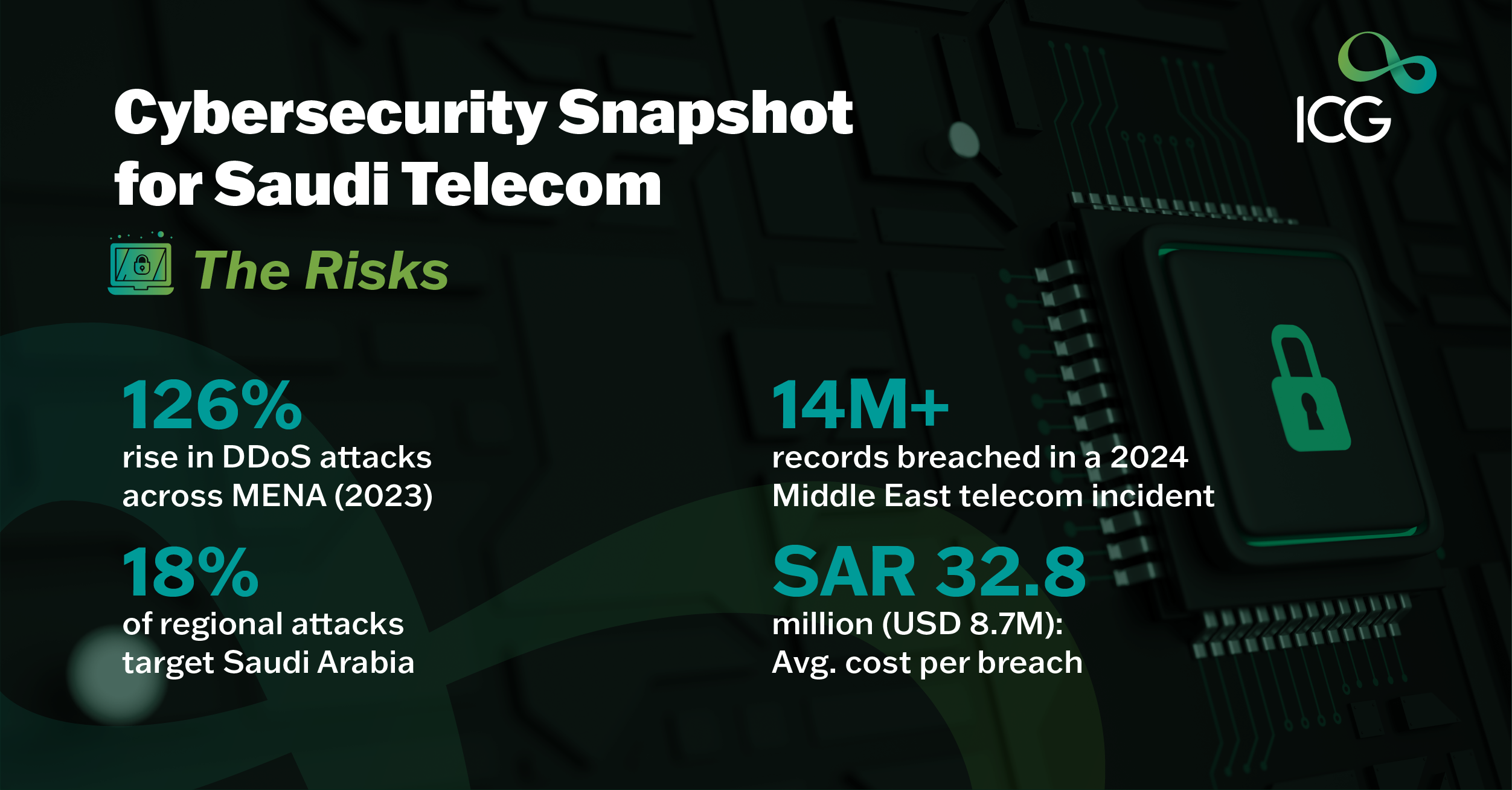As Saudi Arabia advances rapidly with 5G rollout, IoT deployments, and cloud adoption, telecom infrastructure faces increasing cyber threats. The same innovations driving regional growth also introduce new vulnerabilities.
Expanded Networks, Expanded Risks
5G and IoT technologies significantly enhance network capabilities but also create more entry points for cybercriminals. Saudi Arabia, anticipating 80 million cellular IoT connections by 2030, must safeguard every connected device from smart meters to industrial sensors. In the UAE, IoT-related attacks already rank among top security concerns, emphasizing the regional scale of the challenge.
Cloud adoption further complicates the landscape. Telecom providers shifting services to the cloud risk exposure through misconfigured services and vulnerable APIs, potentially compromising vast amounts of sensitive data.
Rising Threats to Saudi Telecom
Saudi Arabia’s telecom sector faces escalating cyber threats, notably:
DDoS Attacks: MENA saw a 126% increase in Distributed Denial-of-Service (DDoS) attacks in 2023, with telecom operators absorbing 21% of incidents. Saudi Arabia alone accounted for 18% of regional attacks, highlighting its vulnerability. Such attacks disrupt services, damaging consumer trust and operational reliability.
SIM-Swapping Fraud: SIM swap attacks surged globally, causing millions in losses. Criminals hijack phone numbers to intercept authentication codes, leading to significant financial damages and erosion of trust in telecom providers.
Data Breaches and Espionage: Telecom operators hold sensitive customer and governmental data, making them prime espionage targets. A 2024 breach exposed 14 million customer records in the Middle East, costing organizations an average of SAR 32.8 million (USD 8.7 million) per incident.
Customer Trust and Economic Implications
Cybersecurity breaches in telecom threaten customer trust, national security, and economic development. Customer confidence is fragile; prolonged outages or data leaks severely affect trust. Moreover, telecom networks support essential national services—any disruption could have widespread implications.
The economic stakes are equally high. Saudi Arabia’s Vision 2030 emphasizes digital transformation, with reliable connectivity as its cornerstone. Cyber incidents could slow digital growth, deterring investment and inflating economic costs. Conversely, strong cybersecurity attracts investment, positioning the region as a secure digital hub.
Defensive Strategies for Saudi Telecom Operators
To strengthen defenses, Saudi telecom providers must adopt proactive, multi-layered strategies:
Zero-Trust Networks: Implement strict access controls, continuous identity verification, and network segmentation to contain potential breaches. Multi-factor authentication and behavior monitoring can significantly enhance security.
AI and Automation: Deploy AI-driven security tools to monitor vast networks in real-time, detecting subtle signs of intrusion. Automated threat response systems mitigate threats instantly, enhancing operational resilience.
Securing IoT Ecosystems: Ensure stringent security protocols for every IoT device and edge node. Strong encryption, robust authentication, and continuous monitoring can neutralize IoT-driven threats before escalation.
Network Resilience and Segmentation: Use techniques like network slicing and internal segmentation to limit damage during breaches. Investing in robust DDoS protection and redundancy ensures service continuity under attack.
Building Cybersecurity Culture: Human vigilance is crucial. Regular training, awareness programs, and cybersecurity drills help embed security into organizational culture, especially amidst the region’s cybersecurity talent shortage. Collaborations with academic institutions and expert consultancies like ICG can help fill skill gaps.
Threat Intelligence Collaboration: Engage actively in public-private partnerships and intelligence-sharing initiatives. Cooperation with entities like Saudi Arabia’s National Cybersecurity Authority (NCA) and international cybersecurity firms can enhance collective defense capabilities.
Securing the Future
Saudi Arabia’s telecom industry stands at the intersection of great opportunity and considerable risk. Proactive cybersecurity strategies that blend technology, human training, and collaborative efforts are critical. Protecting telecom networks ensures not only business continuity but also the resilience of national digital transformation efforts.
In the digital age, cybersecurity is no longer optional—it’s foundational. Saudi Arabia’s telecom providers must remain vigilant, innovative, and collaborative to secure their networks and sustain the nation’s ambitious economic vision.

The ICG Approach
At ICG, we offer a customized approach that empowers your teams with the latest insights and technology expertise to navigate the demands of today’s digital age. As Saudi Arabia embarks on its digital transformation journey, ICG plays a pivotal role in shaping the Kingdom’s tech landscape by providing cutting-edge solutions, strategic consultancy, and fostering innovation. Our comprehensive guidance, from fundamental concepts to practical implementation, helps organizations mitigate risks, stay ahead of the competition, and unlock their full potential in the accelerating digital environment.
Ready to talk?
Request your free Consultation to learn more about ICG’s capabilities and enablement to embark on a transformative expedition toward the summit of success.








